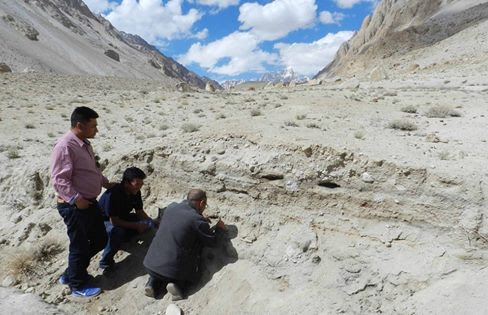
An ancient camping site dating back to 8500 BC has been discovered by the Archaeological Survey of India (ASI) in Jammu and Kashmir's Ladakh region.
The site was unearthed at 14,000 feet above sea level -- on the way to Sasar La which leads to the Karakoram Pass. It suggests that humans camped in the area 10,500 years ago.
An official release stated that Dr. S.B. Ota, ASI Joint Director General, had noticed a section exposed due to road construction while exploring the Nubra valley. It showed "successive layers comprising burning residue".
"It was a small flat area with snow-covered peaks on one extreme, dry barren land with loose rocks all around and gushing stream within the deep western gorges, an ideal place for camping in a picturesque setting," the release stated.
ASI officials collected a charcoal sample from the site and sent it to Beta Lab, Florida for radiocarbon date determination, which dated the sample back to 8500 BC, following which a team was sent for further archaeological research in July 2016.
"During this visit, more charcoal samples and associated bones were collected. Two of the charcoal samples from lower and upper deposits sent for dating have provided new radiocarbon dates of c. 8500 BC and c. 7300 BC (c. 10500 and 9300 years before present) respectively. New dates also indicate repeated human activity at this camping site for about eight hundred years. Preliminary studies of charred bones collected from here, carried out by Prof P.P. Joglekar of Deccan Collage, Pune, have shown presence of Gorel and Yak," the release said.
The release also stated that the research "proved the antiquity and nature of human activities to an extent, but their camping patterns, extent of camping area, tools and other cultural aspects are yet to be traced." ASI has planned to carry out proper archaeological excavations and explorations to address these issues.
It added that it would be difficult to carry out the task in such a rugged terrain at an altitude of 14,000 feet, with low oxygen and habitation.
Ancient camping site dating 8500 BC discovered by ASI at 14000 feet above sea level: https://t.co/KGl97aPgT4 pic.twitter.com/SJHRqrWVD4
— MIB India (@MIB_India) August 16, 2016















